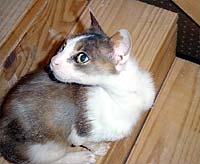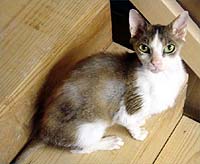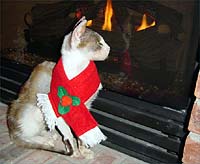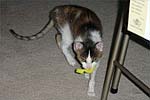Home
< Case Studies Home >
go back || next >>
Notes
Cat: Jean Luc Brucker
male, DSH
[some Maine Coon]
Type of Lymphoma:
GI lymphoma, specifically of the stomach lining, but had spread to kidneys and bowels at times. It was diffused, not a specific tumor or tumors.
FeLV Status:
neg
|
|
|
|
Jean Luc's Case Study
|
next story >> |
 Other Diseases/Conditions:
Other Diseases/Conditions:
CRF, anemia
Story: He was 11 years old at diagnosis. He had vomited a few times a week all his life, so that was normal for him, but the end of October, 2002, he suddenly got much sicker, throwing up blood and having bloody stool. His numbers showed he was in a severe kidney crash. They did a fine needle aspirate of the kidneys, and they did not find lymphoma there. They gave him Carafate (Sucralfate) to heal the ulcerations in the stomach and hoped that would take care of the bleeding and the anemia. However, he continued to become more anemic, even as the blood in the stool stopped. They gave him a blood transfusion and IV fluids so that he would be strong enough for an endoscopy, since the ultrasound showed that they could reach the suspicious area that way. It is less invasive than full surgery. The results of the endoscopy showed a very aggressive, fast-growing lymphoma in the stomach lining. We got the results on November 18, and he started the COPA protocol of chemotherapy, which has helped a lot of kitties with similar lymphomas on the lymphoma list.
However, after three weeks of Cytoxan, Vincristine (Other name Oncovin, which is the “O” in the protocol) and daily Prednisone, the lymphoma not only didn’t respond but actually spread to the kidneys. And his anemia got worse again, back down to 13%. They changed protocols, giving Elspar (also known as L-asparaginase or L-spar), one that is considered a Rescue Drug, and then starting on a protocol of Adriamycin (also known as Doxorubicin) which would have been the “A” in the COPA protocol, and alternated that with Cytosar-U, which was a series of four shots once a day.  He got Adriamycin one week, and two weeks later, got the four shots on four consecutive days. He also started on Procrit on December 2, 2002, for the anemia. His anemia was non-regenerative, which meant his body could no longer make red blood cells. Procrit is the same thing as Epogen, which is what they give cats and people who have anemia related to kidney disease. Since it often takes a few weeks for Procrit to kick in, his HCT actually went down below 11% before it started to rise again. The Procrit kept his anemia under control for the rest of his life, a little over two years, and we had no problems with antibodies. The Adriamycin/Cytosar-U protocol worked for six months. He got Adriamycin one week, and two weeks later, got the four shots on four consecutive days. He also started on Procrit on December 2, 2002, for the anemia. His anemia was non-regenerative, which meant his body could no longer make red blood cells. Procrit is the same thing as Epogen, which is what they give cats and people who have anemia related to kidney disease. Since it often takes a few weeks for Procrit to kick in, his HCT actually went down below 11% before it started to rise again. The Procrit kept his anemia under control for the rest of his life, a little over two years, and we had no problems with antibodies. The Adriamycin/Cytosar-U protocol worked for six months.
After six months, the lymphoma came out of remission, and it went from his stomach to his kidneys and bowels. They changed his protocol to Elspar and CCNU (Also known as Ceenu or Lomustine). He got those on the same day once every three weeks, unless his white blood cell count had not recovered yet. Then it would be delayed a week or so. Eventually, we went to every four weeks and then every five weeks. He had his last dose in October of 2004. He lost weight at an alarming weight after that, and I had hoped that it was something like his thyroid or a B vitamin problem, but it was the lymphoma out of remission. Lymphoma tries to take all the nutrients to feed itself, so even though he was eating well, he was still losing weight. His thyroid was actually low, which the vet said would be expected in a cat with all his health issues.  The B-vitamin test came back normal, so that wasn’t the cause of the weight loss, either. That had to be sent to Texas A & M because Antech doesn’t do a test for that. And when I brought him in for his appointment on December 3, the vet found that the lymphoma had spread again – the ropiness was back in the stomach, which he could feel by palpating, and the blood work showed that the kidneys were once again being affected by the lymphoma. The B-vitamin test came back normal, so that wasn’t the cause of the weight loss, either. That had to be sent to Texas A & M because Antech doesn’t do a test for that. And when I brought him in for his appointment on December 3, the vet found that the lymphoma had spread again – the ropiness was back in the stomach, which he could feel by palpating, and the blood work showed that the kidneys were once again being affected by the lymphoma.
At that point, the vet recommended not to do any more chemo. The only things left to try were probably too strong for his weakened system and would have probably killed him on the spot. So the vet recommended that we take him home, since he was still feeling good, and give him anything he wanted and hope that he died peacefully in his sleep. We did start him on the B-vitamin shot, just in case it would help. We also started on an alternative treatment called PolyMVA. I wouldn’t give it to him while he was on chemo, since they tend to work against each other, but once chemo was no longer an option, I started using some that was given to me by another member of the lymphoma list. I think that the weekly B shots and the daily PolyMVA kept him feeling good for his last three weeks. He was still able to walk up and down the stairs on his own even the day before he died.
Outcome: First remission, six months. Second remission, a year and a half. Jean Luc died on December 25, 2004.
- By Theresa Jean Luc's Mom - |
|
next story >> |
|
|
Photos
![Theresa's Jean Luc [Baby]](cats/jeanlucbaby.jpg)
![Theresa's Jean Luc [Baby]](cats/jeanlucbaby2.jpg)

Chemo Protocol Used
Holistic Remedies Used | |

